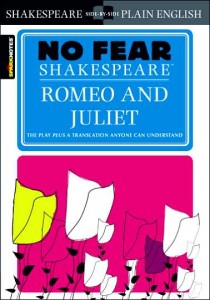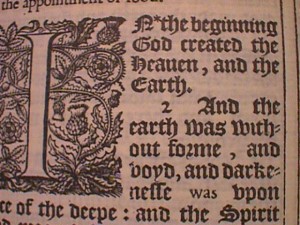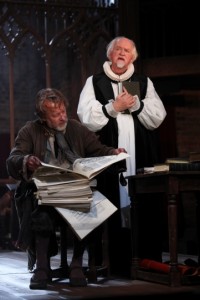 So what is more important: clarity of meaning, or poetry? Mike LoMonico recently wrote a post for the Folger Shakespeare Library’s Education blog challenging the often-voiced opinion that Shakespeare’s plays are now so difficult to understand that they should be translated. The Folger’s answer to suggestions that people should use modern versions is “IF YOU’RE NOT GOING TO USE SHAKESPEARE’S WORDS, DON’T DO SHAKESPEARE.”
So what is more important: clarity of meaning, or poetry? Mike LoMonico recently wrote a post for the Folger Shakespeare Library’s Education blog challenging the often-voiced opinion that Shakespeare’s plays are now so difficult to understand that they should be translated. The Folger’s answer to suggestions that people should use modern versions is “IF YOU’RE NOT GOING TO USE SHAKESPEARE’S WORDS, DON’T DO SHAKESPEARE.”
Nobody would suggest that Shakespeare’s work is easy: no matter how hard you try, there will be some bits that defeat you: editors of scholarly editions spend years on a single play but still never reach a consensus over everything. David and Ben Crystal are experts who run a website, Shakespeare’s Words, which includes a glossary, full text and notes. Part of the site, the Portal, also includes some recordings of Shakespeare in OP (Original Pronunciation), which are great fun.
David Edgar is one of our greatest living playwrights who has both written new plays and adapted existing works for the RSC. No wonder he is so intrigued by the story of the King James bible. His play Written on the Heart is less the story of how the translation was made than an examination of the dilemmas of the people involved. People died for the cause of creating a bible in English for ordinary people to read instead of being told what the scriptures meant by priests. And for much of the play the translators wrestle with the choice of individual words. The devil was literally in the detail.
The first translator of the bible into English, William Tyndale, used everyday speech, “the language of the ploughboy”, and in the play he challenges (from beyond the grave) the decision of the King James Bible translators to make the word of God both grand and poetic. He accuses the translators of sacrificing “the clear to the majestic”, and “sacrificing the meaning to the music”. Launcelot Andrewes’ response is that the translation is intended “to make the majestic clear”.
Modernisers of Shakespeare like No Sweat Shakespeare and No Fear Shakespeare have the same aim. No Sweat Shakespeare creates ebook versions of some of Shakespeare’s plays and contains other features designed to make Shakespeare fun. No Fear Shakespeare publishes text versions. It’s a difficult and complex job. Here are a couple of lines from the balcony scene in Romeo and Juliet with the corresponding line from No Fear Shakespeare:
Shakespeare: Oh, she doth teach the torches to burn bright!
No Fear: Oh, she shows the torches how to burn bright!
Shakespeare: It seems she hangs upon the cheek of night
No Fear: She stands out against the darkness.
For Tyndale, the music of the word of God was unimportant compared with the meaning. In Shakespeare, though, the music of the verse has its own importance. I wouldn’t say it’s more important than the meaning, but sometimes you can let the meaning take a back seat and enjoy the poetry. I’ve written before about some of my favourite performances of Shakespeare’s speeches and how important it is to hear Shakespeare spoken well.
But it’s also important to be fair to modernised versions. They are created to help students get over the difficult hurdle which Shakespeare’s language can present, and they have their place. They are meant to enhance the experience of reading Shakespeare’s original, not to replace it.
The King James bible owes much to Tyndale’s translation. But it, like Shakespeare’s work, has stood the test of time not least because of the beauty of its poetic language and phrasing.




Regardless of how hard the “translators” of Shakeapeare’s plays worked, these editions do not *help* students. By providing these books, the authors are saying to this and future generations that Shakespeare is hard, and that their translation is the best way to understand. Shakespeare isn’t plots or characters alone, but words. These translations lose the *magic* of his poetry – not just the poetry itself – because they provide only one way to understand each line, when there could be dozens of ways to understand them if only teachers and students alike were prepared to discuss them after reading them aloud in class. Finally, these books don’t need defending. Teachers and students are only too prepared to use them to get by, Shakespeare’s language itself – in all it’s poetical, theatrical, magical originality – is what needs defending against this.
In teaching Shakespeare, perhaps it would be helpful to discuss with students Louise Rosenblatt’s ideas of efferent and aesthetic reading. Efferent reading is for facts or information. The most extreme example of efferent reading is the man who has ingested something toxic and desperately reads the lable on the bottle to find the antidote. Who cares how poetically it is written!
Aesthetic reading is for appreciation of literary quality.
Aesthetically, if we teach students to appreciate poetry simply for the way it sounds – assonance, alliteration, onomotopoeia, rhyme – we can read “O she doth teach the torches . . .” asking them to listen to the sounds, to identify alliteration, etc., and to comment on the extent to which they are pleasing to the ear.
Then, engaging in efferent reading, we can ask, “Now that we have identifed these sounds in this passage, lets make a stab at what we think it means. ” Ask kids to write down and discuss what they think the lines mean. Then show them some of the modern “translations.” Compare the poetic quality of the newer versions with that of the original. If we have done our job well, I suspect most students will see – and hear – that Shakespeare wins, hands down!
Thanks for your comment. I certainly agree that no modern version can approach Shakespeare’s poetry, and I like your idea of bringing them in for comparison as part of a session analysing a passage!
The lines you have cited here, the No Fear “translations,” do readers actually struggle with Shakespeare’s version? “Oh, she doth teach the torches to burn bright!” needs to be explained? What is confusing about “It seems she hangs upon the cheek of night”? Those who require this sort of assistance are aware, I hope, that “Out, damned spot!” has nothing to do with the family dog.
Mike Lomonico cites a few lines from NO FEAR Shakespeare and writes off every attempt to make Shakespeare more interesting and less academic as rubbish? Shakespeare will be rolling in his grave at such a wholesale dispensation.
Good grief…
Paul, I agree this is a complex issue. There is a place for simplifying (think back to Lamb’s Tales from Shakespeare which has been introducing children to Shakespeare for about 200 years!), but I think Mike’s point is that it mustn’t be a substitute for the real thing.